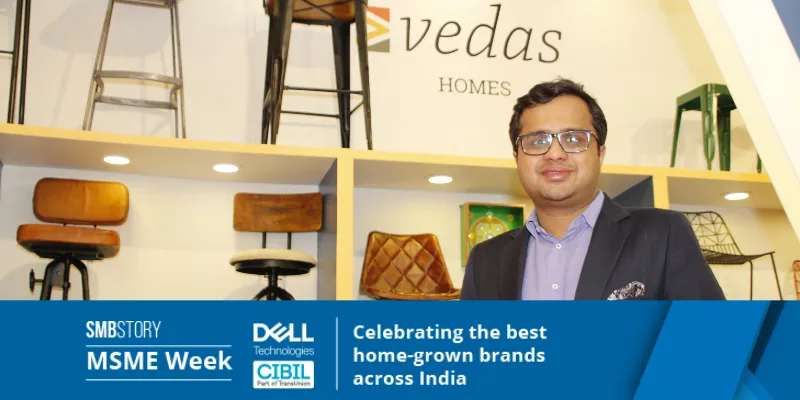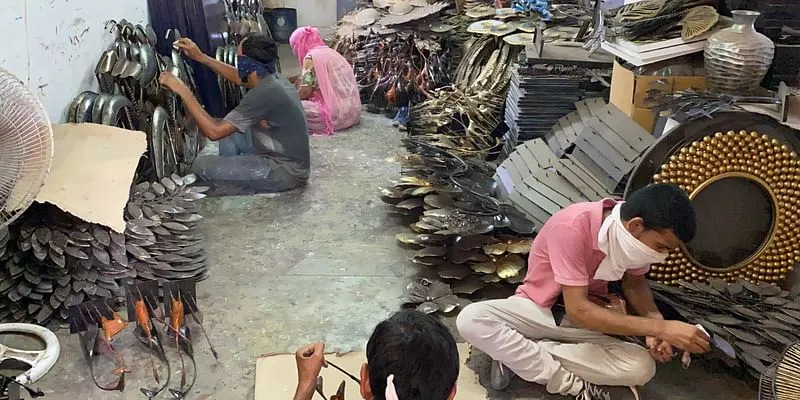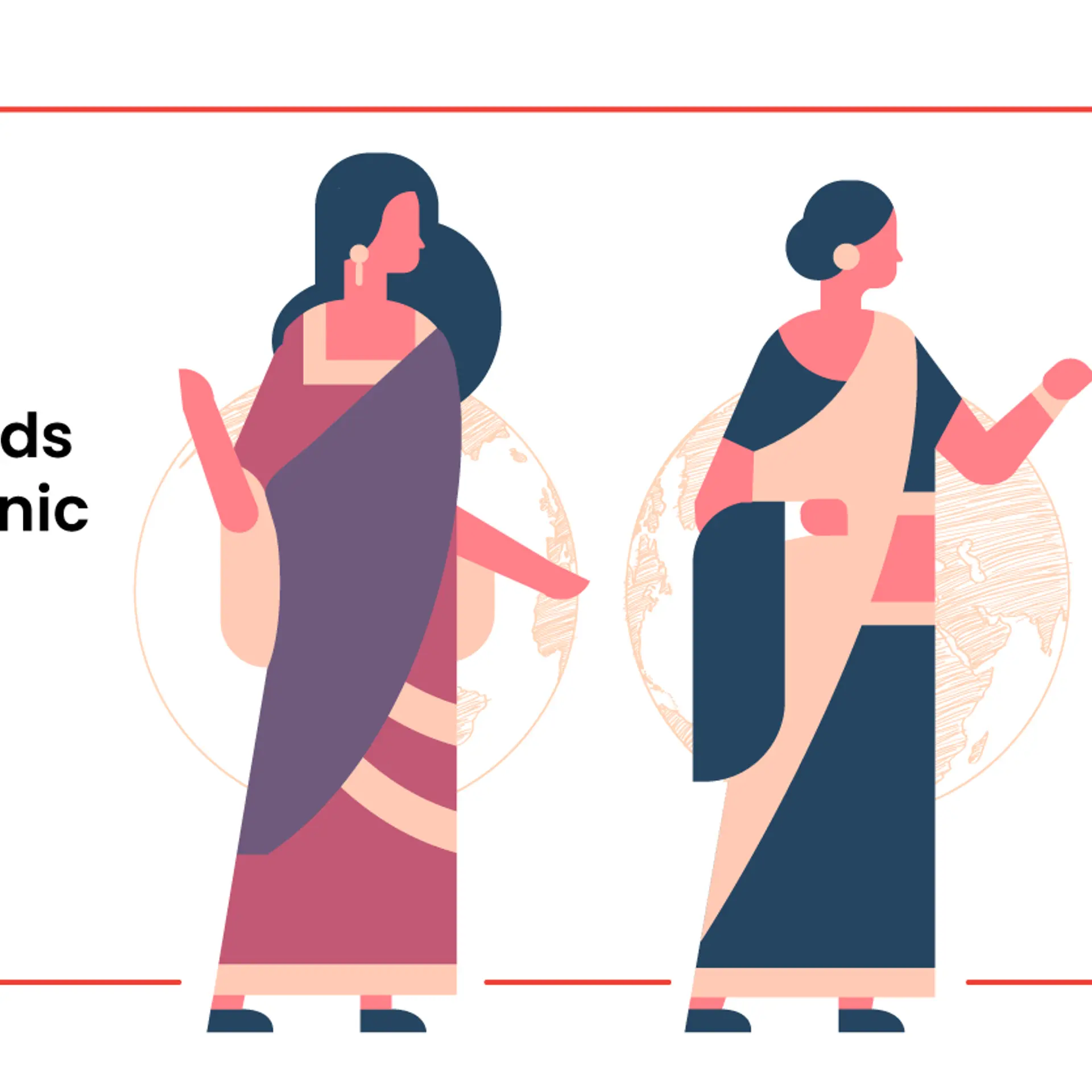From selling 1 item a month to 10,000: story of home decor business Vedas Exports
Started in 2014 by Palash and Pawan Agarwal in Ranchi, Vedas Exports manufactures handicrafts, and exports them to international markets such as the UAE, the US, and Europe. Last year, it recorded a Rs 7.9 crore turnover.

Vedas Exports cofounder and director Palash Agarwal
When Palash Agarwal teamed up with his businessman father Pawan Agarwal to start a company, little did he know that they would sell only one product in the first month. Vedas Exports, started in 2014 in Ranchi, was seeing almost no traction with its wooden handicrafts and paintings.
Palash and his father, upon exploring the handicrafts segment further, decided to jump into utility decor such as making wall hooks, shelves, mirrors, and table decor, among others.
“These products had a bigger market and they could be put to real use. As they have an application, buyers are more likely to purchase them,” Palash Agarwal, Co-founder and Director, Vedas Exports, says.
Landing the first 50 customers was the biggest hurdle for the company, and it took six months to achieve it. The father and son, who are co-founders and directors in the company, also did exhibitions across the country and abroad, to boost visibility and ensure customers of product quality.
The market responded well to Vedas’ efforts and sales increased, prompting it to expand into making vases, office decor, and showpieces, among others.
Today, the 110-employee business manufactures handicrafts in Jodhpur, Rajasthan, and exports them to international markets such as the UAE, the US, and Europe.
Vedas Exports made Rs 7.9 crore turnover last year, Palash says, adding that it has a presence in over 700 Indian stores and 500 global ones.
In an interview with SMBStory, Palash recounts how his entrepreneurial journey began, and explains how he took the family business to success.
Edited excerpts from the interview:
SMBStory [SMBS]: What inspired you to start Vedas Exports?
Palash Agarwal [PA]: After completing my studies, I worked with Jaguar Land Rover in the UK, and Z&J Technologies GmbH in Germany. Whenever I looked at offices or home spaces, I could visualise those spaces needing some kind of decor.
I felt a good ambience made all the difference, both at home and at work. I found this idea driving me to create innovative home decor pieces, and this was something I felt I could do for the rest of my life. So, here I am, creating home decor handicrafts which I know bring a smile to my customers, as well as my team.
SMBS: How did you gather the resources to start?
PA: We are completely bootstrapped, and started with an investment of Rs 10 lakh in the beginning. To understand more about our sector and the trends, we started going to several exhibitions to gather information.
After this market research, we went looking to set up the manufacturing process for making the handicrafts. We travelled to Jodhpur, Moradabad, Hazaribagh, Bastar, etc. Initially, it was difficult to identify what products to make, but after getting into the market and doing in-depth research, we decided on our products and figured out how to make them.
SMBS: What were the initial challenges? How were they solved?
PA: We sold just one product in the first month, and it was a big challenge to retain our team of artisans when we were receiving very few orders. We gave them the basic pay and limited work to ensure constant workflow, and that they stuck with us.
Another hurdle was building trust and a good customer base. Doing exhibitions across the country and abroad helped in this aspect.

Inside the Vedas Exports facility in Jodhpur
SMBS: At present, what is your business model?
PA: We are into B2B and B2C, and also sell via ecommerce platforms. Under our B2B model, we supply our handicraft products to various home decor stores. In B2C, we sell directly to customers through our website and social media pages.
We are also present on Amazon, , , etc. Additionally, we customise products according to the customers’ needs, preferences, and styles.
SMBS: What is the USP of your products? What is their pricing?
PA: Our products are completely handmade, rust-free, powder-coated, and painted in lead-free colours. We believe in the uniqueness of style and design, depending on the current trends.
In regards to pricing, our products start as low as Rs 799 and go up to Rs 64,999. We aim to cater to people from all walks of life where everyone should be able to afford us. We maintain uniform pricing for all levels, such as for distributors, dealers, architects, and high-end clients, and ensure there will be no price disparity.
SMBS: Who is your target audience? What is the export strategy to reach them?
PA: Our target audiences are organised stores, standalone brand stores, marketplaces, customers shopping on online portals, architects, buying agencies, and importers across the world. We target them through exhibitions, online promotions, and B2B meetings.
We have fixed exhibition plans across the world, which also helps our exports. We participate and showcase our products in various shows in Germany, South Korea, China, Dubai, and the UK, among others.
SMBS: Who are the competitors? How are you staying ahead of them?
PA: Many décor companies in Jodhpur and Moradabad are our competitors. They are our source of motivation and energy. They keep us motivated to work hard, build, develop, and diversify our products. This is our strategy to stay ahead of the game.

Wall decor made by Vedas Exports
SMBS: How did COVID-19 affect your business?
PA: The pandemic and the subsequent lockdown scenario has forced people to stay indoors and spend time at home. Thus, we expect a growth in demand for home décor items once things become fully functional.
Currently, we are operating mostly online. Wherever stores are allowed to be functional, we are operating from there. Right now, it is time to ideate and do research.
SMBS: What are the future plans for Vedas Exports?
PA: We plan to build a franchise module and come up with company-owned stores across India, the UAE, Nepal, and the UK. We aim to create 60 offline stores by next year under franchise and owned modules. We are also planning to venture into the furniture segment.
Edited by Suman Singh








